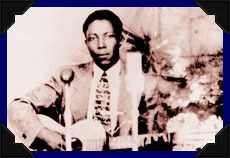
Born November 30, 1909, in Helena, Arkansas, Robert McCullum was raised on a farm. An older musician, harp player Eddie Jones, taught fourteen-year-old Robert to play harmonica circa 1923. During the 1920s, McCullum began the rambling that became his trademark. He ranged across the Delta playing with Will Shade of the Memphis Jug Band in Memphis, and working the Black Cat Drug Store in Hollandale, Mississippi, with William Warren. He played juke joints and fish fries in between.
Around 1930, McCullum was working on a farm in Murphy Bayou with his cousin Houston Stackhouse. During their leisure time Stackhouse taught his cousin to play guitar, mostly numbers by local bluesman Tommy Johnson. The two teamed with Robert's brother Percy to play parties, dances, and fish fries around Crystal Springs, Mississippi. Robert and Stackhouse even backed country music star Jimmie Rogers at a Jackson, Mississippi, hotel. Resuming his wanderings, armed with a guitar, McCullum traveled across the Delta, making the acquaintance of Charley Patton and Robert Johnson while living in Friars Point, Mississippi. He then moved north to Memphis, where he had an extended engagement with John Lee Hooker at the New Daisy Theater and gigged at open-air appearances with the Memphis Jug Band.
McCullum left the Deep South in the mid 1930s, allegedly for shooting a man, and moved to St. Louis, where he adopted his mother's last name, McCoy. While there, he met and played with the icons of the St. Louis blues scene: Henry Townsend, whom he'd played with in Friars Point, Charley Jordan, Speckled Red, Big Joe Williams, John Lee "Sonny Boy" Williamson, and Peetie Wheatstraw. McCoy's friends in St. Louis, recognizing the young man's talent, brought him to Chicago to record with them. McCoy lived in St. Louis during the late 1930s, but returned to Chicago to record as a soloist and accompanist. It was then that he recorded "Prowling Night-Hawk," one of his most popular sides. His recordings demonstrate a hard, melancholy voice that perfectly complements a delicate, ringing, liquid-sounding slide guitar. He recorded a variety of boogies, blues, and ballads, demonstrating ability equal to or surpassing the material. McCoy recorded widely as a sideman on guitar and harp, backing Peetie Wheatstraw (as Peetie's Boy), Walter Davis, and Sleepy John Estes.
McCoy returned to live in Helena in 1942, assuming the name Robert Nighthawk to identify himself with his popular record. While in Helena, he earned a spot on radio station KFFA, broadcasting out of the Floyd Truck Lines Building. His chief rival was Rice Miller, a harmonica player who styled himself Sonny Boy Williamson and also had a show on KFFA. Nighthawk's work on the radio and in local performances influenced Delta guitarists Muddy Waters, Elmore James, Earl Hooker, and B.B. King.
Nighthawk based himself in Cairo, Illinois, in the late 1940s and recorded his most memorable sides for Aristocrat from 1948 to 1950. During the early 1950s he recorded for a variety of labels in Chicago before returning to live in the Friars Point/Helena area. Nighthawk was rediscovered during the "blues revival" of the 1960s, enjoying a brief period of popularity before his death.
Robert Nighthawk died November 5, 1967, and is buried in an unmarked grave in Helena's Magnolia Cemetery.
Last updated: October 27, 2017
